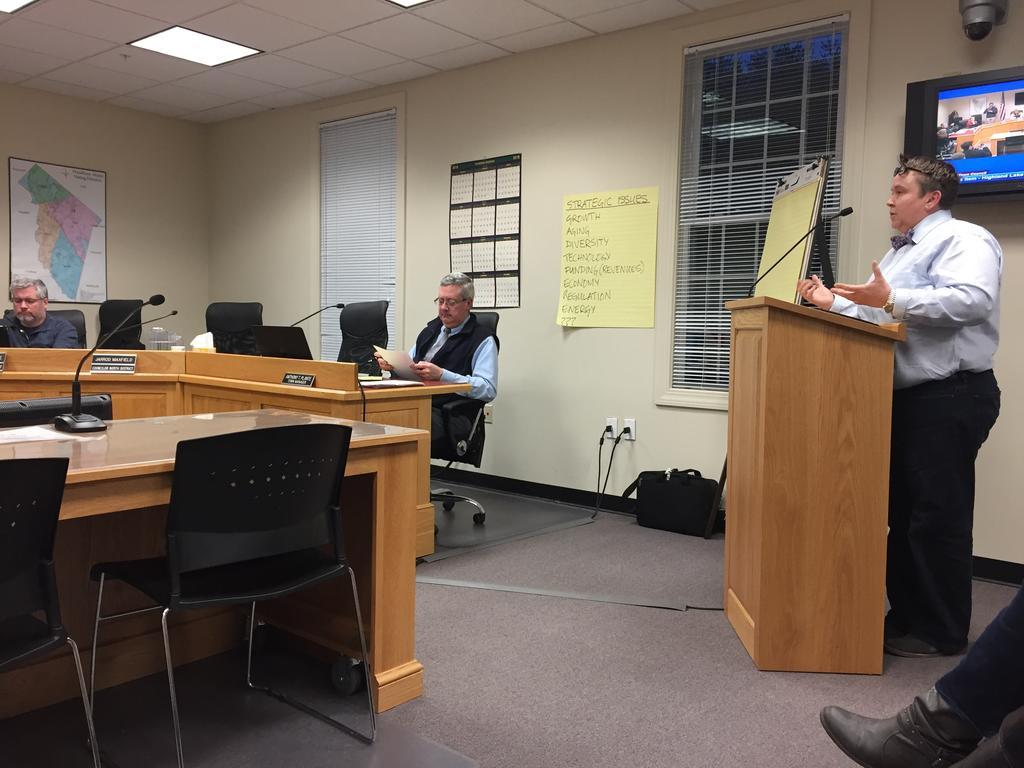WINDHAM — Town staff has developed an amended version of Windham’s existing moratorium on most development activity in the Highland Lake watershed, which the Town Council could consider later this month.
The proposed changes to the moratorium, which Town Manager Tony Plante outlined at a council workshop last week, would scale back the impact on smaller projects while continuing to put a hold on subdivision development, projects requiring site plan review by the Planning Board and the construction of new private roads.
“In effect, it would lift the moratorium on any other development activity in the watershed – homes, additions, driveways, porches, decks, etc.,” Plante said at the April 3 workshop.
In September 2017, the Council voted 6-0 to establish a temporary 180-day ban on most development activities within the watershed in Windham.
The move came in response to concerns about the lake’s health and water quality after a mysterious and temporary bloom had been observed for the past four summers. Researchers believe the culprit to be a form of cyanobacteria, also known as blue-green algae, but are still unsure of the species or source.
In late February, the Windham Council voted 6-1 to extend the existing moratorium as an emergency measure — as it was passed last September.
Because the extension was passed on an emergency basis, the Council is required by the town charter to hold another vote within 60 days in order to uphold the extension. That means if the council is to extend the original moratorium or an amended version, it must do so by late April.
Plante said that council is scheduled to hold public hearing and vote on April 24 meeting.
Some members of the public have raised concerns about the moratorium since it was passed last September, indicating it has negatively impacted their development plans — including the construction of single-family homes, sale of lots, or additions to existing structures.
“The council expressed some sympathy for people caught in this situation, and wanted to find some way to provide some relief,” Plante said last week.
Plante said that he worked with legal staff and former Planning Director Ben Smith, who left his role with the town last week for work as a planning consultant, in order to come up with ideas to modify the moratorium.
Highland Lake is split primarily between the towns of Windham and Falmouth, though it also touches Westbrook. Windham is the only of the three towns to enact a moratorium tailored specifically to development around Highland Lake.
The towns of Windham and Falmouth have joined together to create a Highland Lake Joint Leadership Team, which recently held a forum with researchers and water quality experts to discuss the current situation.
The Windham Council has also enacted changes to the town’s surface water protection ordinance specific to the Highland Lake area, including a point system for smaller development projects not subject to subdivision or site plan review.
Plante said that point system has yet to take effect with the moratorium still in place.
If passed by the Council, the amended moratorium would continue to apply to any new subdivision application, project requiring site plan review, or new private road in the watershed or any of those projects which had not received final approvals by September 5, 2017.
That would include Highland Views project proposed by Chase Custom Homes & Financing, a manufactured housing park and mixed-use development already in the review process when the moratorium was first discussed and passed.
Chase Custom Homes owner John Chase had alluded to possible legal action over his property rights before the moratorium was passed, and last week sent an email to Plante’s executive assistant asking for the name of the law firm that represents the town.
“Can you please help me with the answer so I can contact the Towns (sic) law firm for a notification to the Town prior to the April 24 council meeting. It is urgent at this point,” Chase wrote in his April 6 email.
In an email to the Lakes Region Weekly, Chase said Plante later told him that Portland-based firm Preti Flaherty represents the town. Chase believes that to be a conflict because he said Preti Flaherty has represented him in the past.
He also indicated that he is currently out of state but has “a large law firm dealing with this for me at the next town meeting.”
Former Windham Director of Code Enforcement Heather McNally spoke at last week’s meeting and said that she now works as an employee for Chase Custom Homes.
McNally said it was clear the proposed changes would affect the Highland Views project, and suggested lifting the moratorium “for the development side” as well.
“I want you to think about the proposal that you have in front of you right now, because you’re looking a the lifting the individual sites, the ones that are not regulated by site law regulation, stormwater regulation,” McNally said. “The proposed development actually is regulated by site law, and it requires annual inspections for that specific program.”
Plante said that subdivision and site plan projects were not included because the town is reworking its phosphorus standards to match the current DEP standard, rather than an old standard.
McNally said that Chase Custom Homes is “looking at trying to alter the plan a little bit to make less disturbance area so there might be more of a cluster type setting so there’s less disturbance, less cutting and everything else.”
She also indicated a willingness to open up “some more dialogue ” with the Highland Lake Association, which led the push for the moratorium in September and has been raising alarms about the health of the lake.
Matt Junker can be reached at 781-3661 ext. 123 or mjunker@keepmecurrent.com. Follow him on Twitter: @MattJunker.

Former Windham Director of Code Enforcement Heather McNally spoke before the Town Council last week on behalf of Chase Custom Homes and Financing.
Comments are no longer available on this story